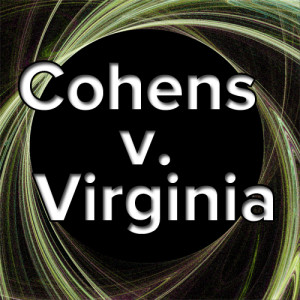Menu
Hot-Topics
May 17, 2022 | SCOTUS Wraps Up Oral Arguments for the Term
Home » Historical










Historical

Selective Draft Law Cases Hold Conscription Is Constitutional
In Arver v. United States, 245 U.S. 366 (1918), the U.S. Supreme Court held that Congress was authorized under the Constitution to compel military service pursuant to the Sel...

Standard Oil Company of New Jersey v. United States
In Standard Oil Company of New Jersey v. United States, 221 U.S. 1 (1911), the U.S. Supreme Court held that the Standard Oil Company was guilty of operating a monopoly in...

Yick Wo v. Hopkins: Neutral Law and the Equal Protection Clause
In Yick Wo v. Hopkins, 118 U.S. 356 (1886), the U.S. Supreme Court first held that discriminatory enforcement of a facially neutral law violated the Equal Protection Clause o...

In re Eugene v. Debs: The Commerce Clause & Labor Strike Injunction
In In re Eugene V. Debs, 158 U.S. 564 (1895), the U.S. Supreme Court upheld the government’s use of a court injunction to order striking workers back on the job. In a unani...

Cohens v. Virginia: U.S. Supreme Court Trumps State Courts
In Cohens v. Virginia, 19 U.S. 264 (1821), the U.S. Supreme Court established itself as the highest court in the county. The justices expressly held that the Court had appell...

Livingston v. Van Ingen: NY Appeals Court Tackles Commerce Clause
In Livingston v. Van Ingen, 9 Johns. R. 507 N.Y. 1812, the New York Court for the Correction of Errors upheld a New York statute authorizing a monopoly on steam boat transpor...

Lochner v. New York: Liberty of Contract
In Lochner v. New York, 198 U.S. 45 (1905), the U.S. Supreme Court struck down a New York law that established maximum working hours for bakers. According to the majority, th...

Supreme Court Upholds Antitrust Act in Northern Securities Co. v. United States
In Northern Securities Co. v. United States, 193 U.S. 197 (1904), the U.S. Supreme Court held that a holding company formed to create a railroad monopoly violated the Sherman...

Pollock v. Farmers Loan & Trust Co.: Federal Income Tax Violated the Constitution
In Pollock v. Farmers Loan & Trust Co., 157 U.S. 429 (1895), the U.S. Supreme Court held that federal taxes on interest, dividends and rents violated Article 1 of the U.S...

United States v. E.C. Knight: Court Upholds Sherman Anti-Trust Act
In United States v. E.C. Knight, 156 U.S. 1 (1895), the U.S. Supreme Court held that the Sherman Anti-Trust Act was a valid exercise of Congress’ power under the Commerce Claus...
Previous Articles
SCOTUS Wraps Up Oral Arguments for the Term
by DONALD SCARINCI on May 17, 2022
The U.S. Supreme Court has concluded its oral arguments for the October 2021 Term. The justices hea...
SCOTUS Rules Censure of Elected Board Member Didn’t Violate First Amendment
by DONALD SCARINCI on May 10, 2022
In Houston Community College System v. Wilson, 595 U.S. ____ (2022), the U.S. Supreme Court held th...
Supreme Court Breach Is Not the First Involving Roe v. Wade
by DONALD SCARINCI on
The recent disclosure of Justice Samuel Alito’s decision purporting to overturn Roe v. Wade is ar...
The Amendments
-
Amendment1
- Establishment ClauseFree Exercise Clause
- Freedom of Speech
- Freedoms of Press
- Freedom of Assembly, and Petitition
-
Amendment2
- The Right to Bear Arms
-
Amendment4
- Unreasonable Searches and Seizures
-
Amendment5
- Due Process
- Eminent Domain
- Rights of Criminal Defendants
Preamble to the Bill of Rights
Congress of the United States begun and held at the City of New-York, on Wednesday the fourth of March, one thousand seven hundred and eighty nine.
THE Conventions of a number of the States, having at the time of their adopting the Constitution, expressed a desire, in order to prevent misconstruction or abuse of its powers, that further declaratory and restrictive clauses should be added: And as extending the ground of public confidence in the Government, will best ensure the beneficent ends of its institution.
Awards




